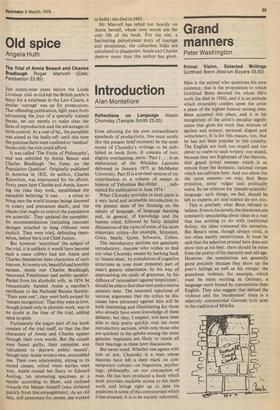Old spice
Angela Huth
The Trial of Annie Besant and Charles Bradlaugh Roger Manvell (Elek/ Pemberton £5.95) Just ninety-nine years before the Linda Lovelace trial re-tickled the British public's fancy for a striptease in the Law Courts, a similar 'outrage' was up for prosecution. That offending publication, light years from advocating the joys of a specially trained throat, set out merely to make clear the facts of reproduction and the advantages of birth-control. At a cost of 6d., the pamphlet was aimed at the badly-off: until this time the precious facts were confined to 'medical' books only the rich could afford.
It was called 'The Fruits of Philosophy', and was subtitled by Annie Besant and Charles Bradlaugh 'An Essay on the Population Question'. Originally published in America in 1832, its author, Charles Knowlton, was imprisoned for his efforts. Forty years later Charles and Annie, knowing the risks they took, republished the Pamphlet believing 'it was . . . a crime to bring into the world human beings doomed to misery and premature death', and 'the checks that ought to control the population are scientific'. They updated the pamphlet. Its recommendations (including innocent sponges attached to long ribbons) were explicit. They were tried, defending themselves, before the Lord Chief Justice.
But however 'scurrilous' the subject of the trial, it is unlikely it would have become such a cause célèbre had not Annie and Charles themselves been characters of such renown. At twenty-six, beautiful and horribly earnest, Annie met Charles Bradlaugh, renowned Freethinker and public speaker. Parted from his alcoholic wife, in 1874 he romantically handed Annie a member's certificate to the National Secular Society. 'Their eyes met' ; they were both swiped by 'instant recognition'. That they were in love, though joined only in platonic work, was in no doubt at the time of the trial, adding Spice to spice.
Fortunately the major part of the book consists of the trial itself, so that the fine characters of Annie and Charles appear through their own words. But the couple were found guilty, their pamphlet was 'calculated to deprave public morals', though later Annie wrote a new, untroubled one. Their own relationship, strong in its united causes, wilted when battles were won. Annie turned her fancy to Edward Aveling, 'an interesting specimen as a reptile' according to Shaw, and inclined towards the Master himself (who slithered quickly from this entanglement). As an old lady, still passionate for causes, she worked in India; she died in 1933.
Mr Manvell has relied too heavily on Annie herself, whose own words are the only life of the book. For the rest, a fascinating period-piece story of courage and persistence, the colourless links are calculated to disappoint :Annie and Charles deserve more than this author has given.


































 Previous page
Previous page